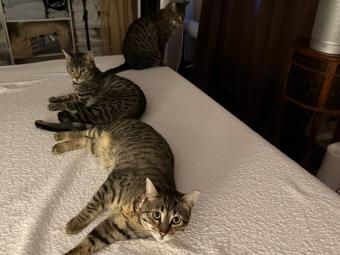Use Hacks to Help You Start a Fire and Keep It Going

Starting a campfire sounds simple, but there are lots of challenges that can make it a bit more complicated. Campfire tips can help you start your fire in any weather and keep it going to cook your meal, keep you warm, and add some cheer to your campsite.
Create a Spot for Your Campfire

Where you light a campfire matters a lot, both for safety and your chance of success. Pick a spot that is free of flammable materials like dead grass and pine needles. Use a dedicated fire pit if there is one. If not, clear vegetation and pile dirt to create a safe "bed" for your campfire. Likewise, choose a place that's sheltered from the wind if possible. This will help you keep the fire going if it's a windy day.
Pick the Perfect Tinder (and Keep It Dry)

Many items make excellent tinder. This is where your fire starts, so it needs to be something that burns quickly and easily. Good tinder sources include small twigs, pine cones, paper, dry bark, or cardboard. Fire starters also work well. Some great options are sawdust, cotton balls dipped in cooking oil, shredded paper melted with wax, or even a bag of really greasy potato chips. No matter what you choose, keep it dry.
Remember to Use Kindling

Tinder starts a fire, but before you can get the big logs to flame, you'll need kindling. Use small sticks or split logs to help the fire establish itself after the quick-burning tinder is gone. Dry sticks about the diameter of your finger are best for kindling. You can also use a kindling splitter to create smaller pieces from a large chunk of firewood.
Use the Best Firewood You Can Find

The wood you use for your campfire can make the difference between struggling to light it and enjoying a roaring blaze. Many locations also have restrictions on the type of firewood you can use. You'll need dry wood, often available for purchase at campgrounds and parks. Local wood is best, since it doesn't contribute to the spread of invasive insects and pests.
Choose Your Campfire Type

There are several types of campfires you can build, and each has advantages and disadvantages. The teepee style is one of the easiest to build, and it involves stacking the wood in a pyramid and placing tinder and kindling inside. A log cabin fire is another great design that allows lots of air to flow between the logs. No matter what style you choose, having a plan makes it easier to light the fire and keep it going.
Start Small When Lighting a Campfire

Once you have all your campfire supplies and a design in mind, start small. Place the kindling over the tinder and add only a few logs in your desired design. Then, use a lighter or some waterproof matches to light the tinder. Blow on it gently to ensure it gets plenty of oxygen. If it's windy, shelter it as much as possible. Continue adding tinder until the kindling catches fire. Then, watch to make sure the larger logs catch. If not, add some more kindling until they do.
Know How to Start a Campfire Without Matches

You should always have matches in your camping supplies, but sometimes, you forget or lose them. Knowing how to start a fire without matches is an important wilderness survival skill. Use a flint and steel or a lens placed in direct sunlight if you have these items handy. If not, make a tinder "nest" and spin a dry stick in a notch in another piece of wood. It can take some time, but eventually, the friction can cause enough heat to start the fire.
Feed Your Fire to Keep It Going

Once you've started the fire, you need to keep it going. There are a few reasons a campfire can go out, including wet wood, lack of fuel, lack of oxygen, or too much wind. Knowing how to keep a campfire going is about managing these challenges. Choose dry wood and continue to put logs on the fire as it burns. Make sure there are spaces between the logs to allow air to flow to the fire. If you are dealing with a windy spot, try erecting a windbreak with gear or tarps a safe distance from the fire.
Sign up for our newsletter featuring all the latest stories and products we love.
Keep Campfire Smoke Out of Your Face

No one likes to sit in the smoke, and it can seem like the way the smoke goes is random sometimes. However, there are some hacks to help keep the smoke under control. Use very dry wood and make sure the fire has plenty of oxygen to minimize the smoke. Then, place a large rock against one side of the firepit to help control the way the smoke blows. Finally, think about the direction of the wind and use windbreaks to control it.
Put the Fire Out When You're Done

When you're done enjoying your campfire, it's important to put it out thoroughly. It can take some time to extinguish a campfire completely; plan for it to take about 20 minutes. Allow it to burn down as your evening ends. When you're ready, dump lots of water over the embers. Use a stick or shovel to stir them and then dump more water. The fire is out when it is no longer hot or smoking.
Enjoy a Well-Made Fire

Once you know how to make a fire and have some campfire tricks for keeping it going, you can sit back and relax in front of a cozy blaze. Share a meal cooked over the campfire or tell some funny campfire stories as you enjoy the warmth and the memories you create.







